The Remarkable Feline Sense of Smell
Cats possess an extraordinary olfactory system that makes them particularly drawn to feet. With approximately 200 million odor sensors in their noses (compared to our mere 5 million), cats can detect subtle scents that humans can't even perceive. This heightened sense of smell, combined with their specialized vomeronasal organ (Jacobson's organ), allows them to gather detailed information about their environment and the people in it.
What Makes Feet So Interesting to Cats?
Your feet are essentially information centers for your cat. They contain thousands of sweat glands that produce unique scents carrying details about where you've been, what you've touched, and even your emotional state. For cats, sniffing your feet is like reading a detailed diary of your daily activities.
Additionally, feet collect various environmental scents throughout the day, making them particularly intriguing to indoor cats who have limited access to outdoor stimuli. This explains why cats often show increased interest in feet after you've been outside or visited new places.
The Social Significance of Foot Sniffing
When cats smell your feet, they're not just being nosy – they're engaging in important social behavior. This interaction serves multiple purposes:
- Gathering information about your activities and encounters
- Establishing and reinforcing social bonds
- Marking you as part of their territory through scent exchange
- Creating a shared group scent that strengthens your relationship
Understanding Your Cat's Foot-Related Behaviors
Beyond simple sniffing, cats may exhibit various foot-related behaviors:
- Rubbing against feet (bunting)
- Lying on shoes or socks
- Licking feet
- Following feet around
- Showing the Flehmen response (a grimace-like expression)
Each of these behaviors represents different aspects of feline communication and social bonding. For instance, when your cat rubs against your feet, they're depositing their scent markers while simultaneously gathering information about you.
When Should You Be Concerned?
While foot sniffing is typically normal behavior, excessive attention to feet might sometimes indicate:
- Anxiety or stress
- Territory-related issues
- Changes in the household environment
- Medical conditions requiring veterinary attention
If your cat suddenly becomes obsessed with feet or shows other behavioral changes, consult with your veterinarian to rule out any underlying issues.
Frequently Asked Questions
Why do cats sniff and lick human feet so often?
Cats sniff and lick feet because they're rich in scent information. The sweat glands in feet produce unique odors that tell cats about your activities and health. Licking can be a social bonding behavior similar to how cats groom each other in the wild.
How does a cat's sense of smell explain their fascination with feet?
Cats have an incredibly powerful sense of smell with 200 million odor sensors. This sophisticated olfactory system makes them particularly sensitive to the complex scents emanating from human feet, which provide them with valuable social and environmental information.
What does it mean when my cat rubs or bunts against my feet?
When cats rub against your feet, they're engaging in scent marking behavior called bunting. This action deposits their scent on you, effectively marking you as part of their social group while also gathering information about you.
Why do cats sometimes make a funny face after sniffing feet?
This expression, known as the Flehmen response, occurs when cats channel scents into their vomeronasal organ for deeper analysis. It's not a sign of disgust but rather indicates they're processing complex scent information.
How can I gently discourage my cat from obsessively sniffing or licking my feet?
To redirect this behavior, provide alternative enrichment activities like interactive toys or scratching posts. You can also reward attention to other body parts and ensure your cat has plenty of environmental stimulation to satisfy their natural curiosity.






